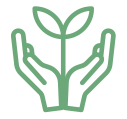Native Seedling Nursery
Located on the Serra Grande/Uruçuca highway, the Floresta Viva Institute Nursery was inaugurated in 2009, the result of a partnership with the SOS Mata Atlântica Foundation. The initial focus of the nursery was to cover seedling production demand for a restoration project in the Serra do Conduru State Park. With the infrastructure created, the Nursery established a production capacity of up to 50,000 seedlings of forest species per year.
The seeds used in the nursery are mostly collected by the IFV technical team, which maintains a close relationship with producers and farm owners in the municipalities of Uruçuca, Itacaré, Maraú, Una and Ilhéus. After being processed and germinated, the seeds take around four to six months to become seedlings ready for planting.
The seeds used in the Nursery are purchased from small farmers in the APA Costa de Itacaré-Serra Grande. There are more than 40 families associated with a network of parent trees (seed suppliers) identified by Floresta Viva, who experience in practice the benefits of keeping forests standing. The technical team at IFV not only collects seeds, but also provides technical assistance to these farmers so that they can produce their own seedlings with quality.
The Instituto Floresta Viva nursery was inaugurated in 2009, the result of a partnership with Fundação SOS Mata Atlântica. The nursery's initial focus was to meet a demand for the production of seedlings for a restoration project in the Serra do Conduru State Park. With the infrastructure created, the Nursery established a production capacity of up to 100,000 seedlings of forest species per year.
The seeds used in the nursery are mostly collected by the IFV technical team, which maintains a close relationship with producers and farm owners in the municipalities of Uruçuca, Itacaré, Una and Ilhéus. After being benefited and germinated, the seeds take around four to six months to become seedlings ready for planting.
The Nursery is usually open to the general public, interested in learning about the various stages of reforestation: the choice of seeds, the development of seedlings, and the maintenance necessary for the full growth of plants. Visitors also have the opportunity to walk through an educational ecotrail and contemplate various species that inhabit the Atlantic Forest, including specimens of Conduru, Pau-brasil and Pau d’arco.




